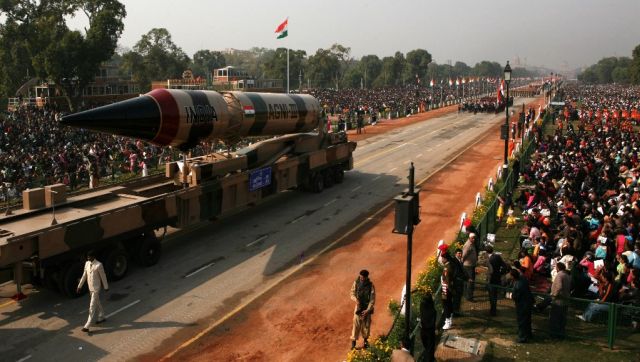The Lok Sabha on Wednesday passed a bill that sought to prohibit the funding of weapons of mass destruction (WMDs) with External Affairs Minister S Jaishankar stating that the passage of the legislation will strengthen national security and enhance India’s reputation globally.
#TodayInParliament
— SansadTV (@sansad_tv) April 6, 2022
‘We believe that no solution can be arrived at by shedding blood.’#LokSabha passes The Weapons of Mass Destruction and their Delivery Systems (Prohibition of Unlawful Activities) Amendment Bill, 2022 #BudgetSession2022 @DrSJaishankar @MEAIndia pic.twitter.com/4bpu5INjZV
The Weapons of Mass Destruction and their Delivery Systems (Prohibition of Unlawful Activities) Amendment Bill, 2002 provides against the “financing of proliferation of weapons of mass destruction and their delivery systems so as to fulfil our international obligations”. “Today, there are big challenges, especially in the proliferation of nuclear weapons. Our role in global arms control regime is very strong. I firmly believe that with the passage of this Bill, national security and our global reputation will be ensured,” Jaishankar said. What are WMDs? Weapons of mass destruction (WMD) is the term used to describe a munition that can indiscriminately a large number of living beings. In 1977, the United Nations affirmed the definition of Weapons of Mass Destruction as “[…] atomic explosive weapons, radioactive material weapons, lethal chemical and biological weapons, and any weapons developed in the future which might have characteristics comparable in destructive effect to those of the atomic bomb or other weapons mentioned above.” In short, WMDs cover nuclear, biological and chemical weapons. When was the term first used? The term was first used in 1937 by the leader of the Church of England, the Archbishop of Canterbury, to refer to the aerial bombardment in the Basque town of Guernica, Spain during the Spanish Civil War. The number of those killed varies even today – from over 1600 to 126 – but this was one of the first aerial bombings to catch international attention. However, the abbreviation entered popular usage in the early 2000s during the Iraq war. The invasion was justified by the United States and United Kingdon saying that then Iraqi dictator Saddam Hussain was hiding WMDs in the country. No such weapons were found, reports The Indian Express. When were WMDs used The first wide-scale use of chemical weapons began during World War I. The Germans used mustard gases at the village of Langemarck in 1915. They were also used extensively by the British and the French. In World War II, the Japanese made use of biological weapons on China. The United States used nuclear weapons when it detonated two atomic bombs over the Japanese cities of Hiroshima and Nagasaki during World War II. Chemical weapons were used extensively by Iraq against Iran in the war of the 1980s. Which countries have WMDs? Nine countries possess nuclear weapons: the US, Russia, France, the UK, China, India, Pakistan, North Korea, and Israel. [caption id=“attachment_10526911” align=“alignnone” width=“640”]  “I firmly believe that with the passage of this Bill, national security and our global reputation will be ensured,” said External Affairs Minister S Jaishankar.[/caption] A vast majority of nukes are held by the US and Russia. According to the Federation of American Scientists (FAS), Russia has 5,977 nuclear warheads, though this includes about 1,500 that are retired and set to be dismantled, reports BBC. The US has 5,428, France has 290, and the UK 225. China has 350 nuclear weapons, Pakistan’s number is 165, and India has 160. Israel has 90 nuclear warheads and North Korea has 20, says the FAS. What are the international rules on WMDs? There are several international agreements in place to discourage the use of WMDs. The Geneva Protocol, 1925, banned the use of chemical and biological weapons; the Biological Weapons Convention, 1972, and Chemical Weapons Convention, 1992, put comprehensive bans on biological and chemical weapons respectively, reports The Indian Express. India has signed and ratified both the 1972 and 1992 treaties. China, France, Russia, the US, and the UK are also among 191 states that signed the Treaty on the Non-Proliferation of Nuclear Weapons (NPT). Under the agreement, they have to reduce their stockpile of nuclear warheads and, in theory, are committed to their complete elimination, reports the BBC. The number of warheads stored in those countries since the 1970 and 1980s has come down. India, Israel, and Pakistan did not join the NPT, and North Korea left in 2003. What do Indian laws say? In 2005, India introduced The Weapons of Mass Destruction and their Delivery Systems (Prohibition of Unlawful Activities) Act, 2005 “to prohibit unlawful activities in relation to weapons of mass destruction and their delivery systems”. This Act said India is “committed to the objective of global nuclear disarmament” and is “exercising controls over the export of chemicals, organisms, materials, equipment and technologies in relation to weapons of mass destruction and their delivery systems”. Why was the 2005 Act amended? The legislation was introduced by Jaishankar on Wednesday to amend the 2005 Act to provide against the financing of proliferation of weapons of mass destruction and their delivery systems in line with India’s international obligations. It gives the government powers to freeze and seize the assets of people involved in such activity. According to the amendments, the Centre can take action through any authority it has delegated to implement the law. According to the Statement of Objects and Reasons of the Bill, the need to amend the Act rose because “in recent times, regulations relating to proliferation of weapons of mass destruction and their delivery systems by international organisations have expanded”, and “the United Nations Security Council’s targeted financial sanctions and the recommendations of the Financial Action Task Force have mandated against financing of proliferation of weapons of mass destruction and their delivery systems”. With inputs from agencies Read all the Latest News , Trending News , Cricket News , Bollywood News , India News and Entertainment News here. Follow us on Facebook, Twitter and Instagram.


)

)
)
)
)
)
)
)
)



